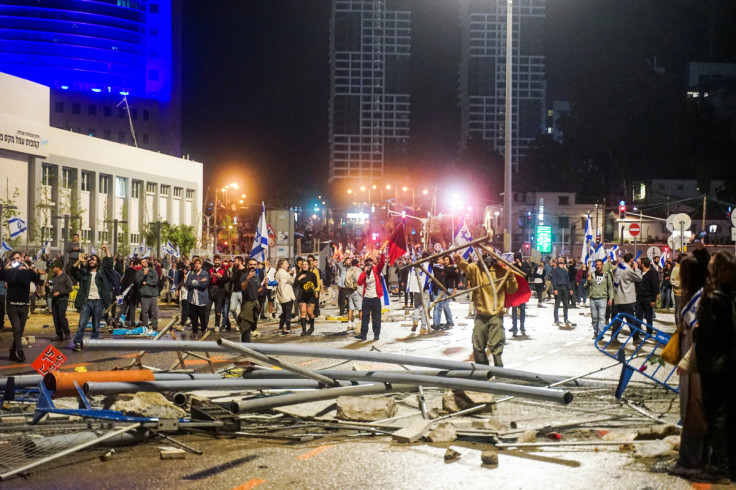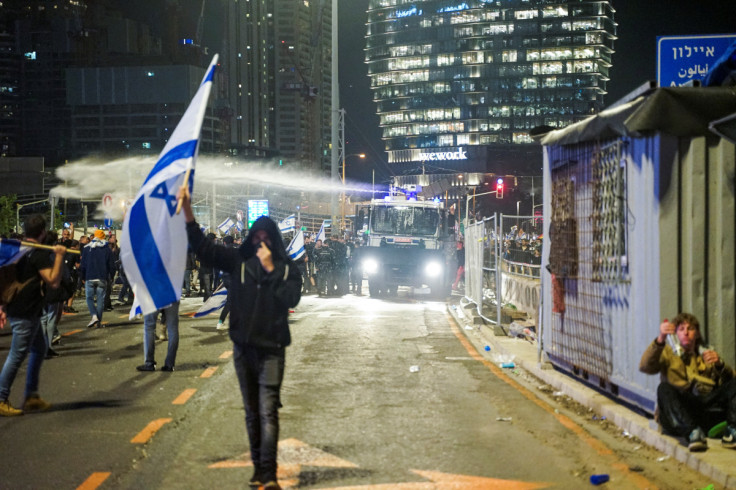Netanyahu Suspends Judicial Overhaul After Day Of Israeli Turmoil

Prime Minister Benjamin Netanyahu paused his signature plan to overhaul Israel's judiciary after a day of nationwide turmoil when workers joined a general strike against the proposal and hundreds of thousands of protesters took to the streets.
The plans by his nationalist religious coalition to hand control over judicial appointments to the executive while giving parliament the power to overturn Supreme Court rulings has ignited one of the biggest internal crises in Israeli history.
Announcing his decision late on Monday to suspend the plans until parliament returns after the break for the Passover holiday and Independence Day next month, Netanyahu said the crisis required all sides to act responsibly.
"Israeli society is on a dangerous collision course. We are in the midst of a crisis that is endangering the basic unity between us," he said in a prime time television address.
As he made the address, huge crowds had gathered in Jerusalem and Tel Aviv, including a large counter-demonstration by right-wing supporters of the overhaul. Their presence prompted fears of possible violence between the two sides but the evening passed with no reports of major violence.
While Netanyahu and his supporters say the plans would ensure a proper balance between the elected government and the judiciary and would not endanger individual and minority rights, they have drawn sustained and furious opposition.
For months, hundreds of thousands of demonstrators have taken to the streets of Tel Aviv, Jerusalem and other cities to protest a project its critics say would destroy the checks and balances protecting Israeli democracy.
Netanyahu, currently on trial on corruption charges which he denies, had previously promised the overhaul would not pose a threat to individual rights but had given no sign of giving way on any of its essentials.
The decision to suspend the overhaul followed an extraordinary weekend in which Defence Minister Yoav Gallant was sacked after warning the divisions caused by the plans had affected the military and were threatening national security.
His dismissal by Netanyahu led thousands to take to the streets and Israel's President Isaac Herzog to urge a halt.
The Histadrut trade union organisation called a general strike that prompted flights from Ben Gurion airport to be suspended and businesses from banks to McDonald's fast-food restaurants to close.
An early rally in Israel's shekel currency fizzled out after Netanyahu suspended the overhaul with its eventual fate uncertain.
Coming at a time when Israel faces a prolonged security crisis in the occupied West Bank as well as rising tensions with Iran, Gallant's dismissal had appeared to many a sign that the government had set aside the national interest.
While opposition parties gave a cautious welcome to Netanyahu's decision to suspend the overhaul to allow time to reach an agreement, many protesters remained mistrustful.
"I will continue protesting until these reforms are completely dropped, because this isn't a set of reforms, this is a coup by the executive," Eitan Kahana, a 27-year-old demonstrator in Jerusalem said.
Within his own coalition, there was also some unhappiness, with hardline Finance Minister Bezalel Smotrich declaring the decision to suspend the overhaul was a mistake but promising to accept the prime minister's decision.
Arab broadcasters carried rolling coverage of the Israeli crisis with some Arabs saying they hoped it would lead to Netanyahu's political demise and others expressing hope of more far-reaching consequences for Israel.
The United States welcomed Netanyahu's action.


© Copyright Thomson Reuters 2025. All rights reserved.





















